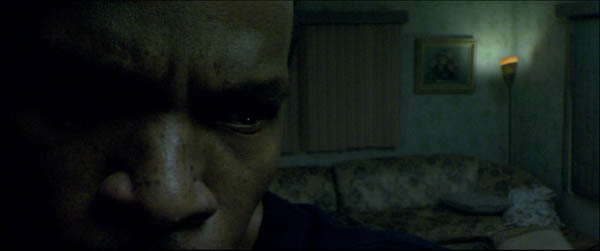An amazingly good movie. Can’t recommend to anyone or they’ll laugh at me (tried a few times already).


Plot is too convoluted to go through. Crockett is sad-faced Colin Farrell and Tubbs is determined Jamie Foxx. Gong Li is on the drug lords’ team, falls in love with Crockett. Tubbs has a lovely wife who is inevitably kidnapped by neo-nazis. Supposedly our heroes are rooting out a mole in the FBI / DEA / System but get sidetracked by so many other things. Shot on crazy-looking HD by Dion Beebe, guy who did Collateral and Holy Smoke.
Didn’t really know what to say about this one until I read an article about it in Senses of Cinema (see below). I loved the movie, loved the unique beauty of the images and the out-of-control propulsion of the plot, but hadn’t thought about what, if anything, Mann was trying to express, what deeper meaning lay behind all the gunfights and high-tech drug deals. The article (written by a french M. Mann biographer and translated by Sally Shafto) brings a lot to light. Reading it feels like I’ve been given permission by a film scholar to love a big-bang action flick that even the general public didn’t like (or just didn’t see).


From Jean-Baptiste Thoret’s analysis in Senses of Cinema:
“Miami Vice is above all a great film on the human condition in a time of flux. Everything progresses at top speed (the meetings, the love affairs, the reversals, the cars) but essentially nothing really moves forward. … In the blurred passage from the cop’s face to the re-framing of the camera on the flow of the traffic, the man has thrown himself under a truck, leaving only a scarlet stain on the pavement. To become integrated in the flux is also to lose oneself therein. … The film closes as abruptly as it opened: Isabella escapes from the flux by the sea (the eternal utopia of Mann’s characters), Sonny turns his back on the sea and returns to the flux. And loses himself therein. Life suspended on one side, perpetual flux on the other. No dead time or respite: the system runs at full speed but on empty, and possesses no other end than that of its own stability. … In the world in flux that Miami Vice follows, the human is only an event, a lost atom in the multitude, similar to the one described by the hired killer in Collateral. It is either arrogance and/or naïveté of the couple, Sonny-Isabella, to have believed that the human could be stronger than the flux. … The men of Miami Dade only conform to the programs that pre-exist them, to respond to the electronic stimuli (a telephone call, a reaction). They turn out to be incapable of taking control of a disarticulated narrative. … The disappearance of the human, its dematerialization in the heart of an urban universe governed by technology, and thus its capacity for resistance, constitutes one of the central themes of Mann’s cinema and finds in Miami Vice its most accomplished extension.”
He also talks convincingly about women being “the only ones to possess the power to divert the narrative”, about flux being technology “and technology is death”, and sums up the ending with Isabella (Gong Li) driving away from Sonny in the speedboat, Sonny’s returning to the flux: “The world rediscovers its balance but loses a little more of its humanity.”